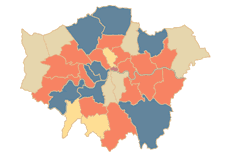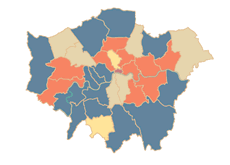Labour predicted to win in local boroughs
Report says party will hold Ealing and Hounslow
A report on the forthcoming London Borough elections has predicted that the Labour party will retain control of the two boroughs that cover the Chiswick area. Although it is acknowledged that there is an outside chance that both boroughs could switch to 'no overall control' the review foresees Hounslow and Ealing not changing hands. A Conservative victory in Hammersmith and Fulham is predicted.
The report is by the London Communications Agency (LCA), a specialist communications consultancy focusing on London and London issues, and Tony Travers of the London School of Economics (LSE). The predictions are based on 'a combination of top-line analysis of each borough, current national political trends, and gut instinct.'
London’s 32 boroughs are currently controlled by Labour, with 15, the Conservatives with 8, the Liberal Democrats
with 3 and 6 are in No Overall Control (NOC). The report predicts that Labour will end with only 10 boroughs and the Conservatives will win six on top of the eight they already control. LCA have committed to pay £250 to St. Mungo's Hospital for each borough prediction that they get wrong.
Despite the ruling Labour group in Hounslow only needing to lose 7 seats before they give up their majority in the Council, the LCA do not see any change of control. The report mentions the historic poor performance of the Conservatives in "a suburban borough where their policies should arguably have more of an impact on the electorate" and highlights that the Liberal Democrats in the last election got a smaller proportion of the vote than independent parties and the Greens combined. Labour's number of seats has fallen to 36 in 2002 from 49 in 1994 but, even given a revived Conservative party and encouraging indications for the opposition in the General Election, where there were significant swings away from Ann and Alan Keen who represent the borough's two Westminster seats, London Communications is still not predicting Labour losing control.
Bedfont, Hanworth Park, Hounslow South and Syon are mention as key marginal seats with 8 that could be potentially lost by Labour. However, with no ABeeC representative standing in Brentford this time around Labour will be hopeful of gaining one seat there. Crime, Heathrow and issues relating to development matters and housing are said to be the key issues in the borough.
Since the publication of the report there has been a split within the local Labour party over the nominations for certain seats in the borough. A number of sitting Councillors were not re-selected and this has prompted them to stand as candidates for the Hounslow Independent Alliance which is a coalition of former Labour and Liberal Democrat Councillors.
They say that Ealing Council has an outside chance of switching to 'no overall control'. Currently Labour hold 46 seats, against 17 for the Conservatives, 4 for the Liberal Democrats (three of which are in Southfield ward) and two others. They highlight East Acton of one of 4 key marginal wards where the Conservatives could expect to gain at least 5 extra seats. However, despite the issue of the tram and what the report describes as the 'more responsive' local Tories, there would have to be a major swing against Labour for there to be a loss of overall control. Labour has a high level of support in parts of the borough; three of the top five Labour voting wards in London in 2002 were in Ealing.
The report highlights a trend for voters in London to be 'anti-incumbent' with a tendency to vote against the party in power nationally. They say this factor alone will mean a reduction in the number of Labour controlled Councils.
Another factor has been the ongoing reduction in turnout at elections. In 1990 the turnout was 46%, in 1998 it was 34.6% and by 2002 it had dropped to 31.6%. The Government has recently launched a campaign to encourage the estimated 500,000 unregistered London residents to sign up, but if they do and don’t vote then the percentage turnout will be even lower.
David Cameron would have a very good chance of winning the next election if he could win the 'bell weather' borough of Ealing which has traditionally been controlled by the party that goes on to win the next General Election. One factor that could help the Conservatives, according to the report, is their more convincing approach to attraction ethnic minority votes. The Tories have made a much greater effort to field candidates that reflect more closely the areas they are likely to represent particularly in West London.
The LCA describes the elections as the most important for at least 20 years and says the outcome will send out important signals for the main parties in the next general election.
April 9, 2006
Related links
| Related Links | |
Candidates standing in the Chiswick area Election Maps of London Results from 2002
LCA Prediction for 2006 Labour launches manifesto for local elections |

